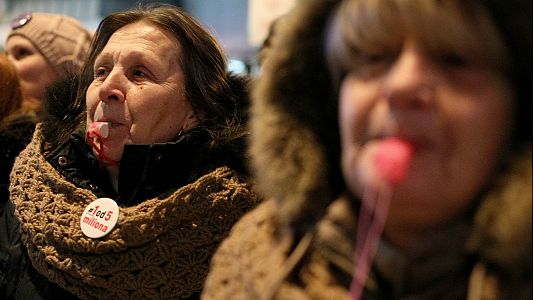Serbia's opposition staged a boycott in the country's parliament on Monday following 10 weeks of anti-government protests. But what are they angry about, how has the president reacted and could we see a snap vote?
Opposition parties in Serbia launched a boycott of the country's parliament on Monday, marking the latest action amid a deepening mistrust of the government.
 ADVERTISEMENT
ADVERTISEMENT
 ADVERTISEMENT
ADVERTISEMENT
The boycott was launched in conjunction with 10 consecutive weekends of anti-government protests, carried out across the country by ordinary citizens.
But what has caused this furore?
Why are Serbians protesting?
Under President Aleksandar Vučić and his ruling Serbian Progressive Party (SNS), many Serbians believe their country is moving toward autocracy, amid reports of officials attempting to silence critics, influencing the media, and placing pressure on voters.
Such actions led Freedom House, an independent organisation tracking freedom and democracy, to downgrade Serbia's national status just last week to "partly free".
Despite ongoing criticisms of Vučić and his government, the weekly protests weren't sparked until December after opposition politician Borko Stefanovic was violently attacked in Krusevac.
In the weeks since, protesters have taken to the streets in dozens of towns across Serbia, including the capital, Belgrade, to demand Vučić's resignation.
But the Serbian president exacerbated the protesters' anger after saying he would not agree to any demand, even "if there were five million of you."
This comment gave the ongoing marches the name #1of5million.
Why have politicians boycotted parliament?
The weekly protests and dismissive government response has sparked a reaction from Serbia's opposition.
Under the name Alliance for Serbia, a group of opposition politicians and parties have agreed to act as a voice of the protesters by boycotting parliament sessions until the demonstrators' demands are met and the government makes way for "free and fair elections".
The grouping consists of a range of political parties from Serbia's centre-left to far-right.
In a detailed list of agreements on its website, Alliance for Serbia said it was "ready to be servants of the people, not of [Vučić's] government."
"We are not boycotting parliament because we are angry and because [the government is] downplaying us, we have a commitment to thousands and thousands of people who are demonstrating in winter and looking for a system and a normal Serbia," politician Sanda Raskovic Ivić said.
"We will not sit barefoot, we will meet citizens."
While the group continues to boycott parliament sessions, they will still remain in the building to carry out their own discussions and take part in press conferences.
How has Vučić responded?
While initially dismissing the protests and criticism of his leadership, Vučić appears to have changed tack.
Opening a new Instagram account last week, he launched a new campaign, the "Future of Serbia," in which he has vowed to visit each of the country's 29 districts to present his plans and listen to the citizens' concerns.
Vučić's debut Instagram post showed him listing his plans, while later posts saw him on his Serbia tour, addressing journalists and crowds.
Despite widespread anger on the streets, Vučić remains the country's most popular presidential candidate, according to recent opinion polls.
A Faktor Plus poll last month, reported by Serbia's Politika newspaper, suggested that Vučić's party would receive 54% of votes in a snap election, while the Alliance for Serbia, which is currently the country's largest opposition grouping, would only get 14% of the votes.
Are there likely to be elections?
With Vučić's Future of Serbia campaign launch and opinion polls weighing in his favour, a number of experts believe these may be early indications of plans for a snap election.
But the Alliance of Serbia has said a snap election would not be enough. Detailing its demands, the group said a number of procedures would need to be undertaken, such as allowing the opposition to conduct televised debates and tackling the spread of disinformation before any election could be considered "free and fair."











